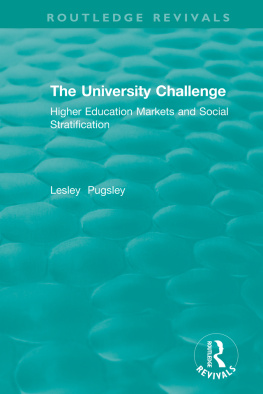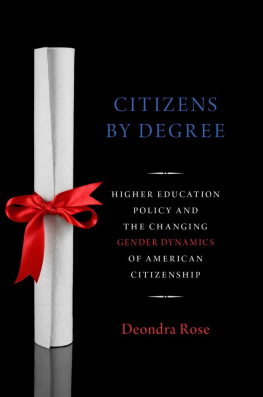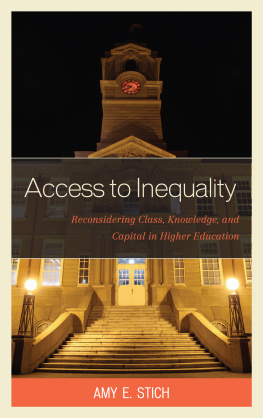NURTURING SOCIAL CAPITAL IN EXCLUDED COMMUNITIES
First published 2000 by Ashgate Publishing
Reissued 2018 by Routledge
2 Park Square, Milton Park, Abingdon, Oxon OX14 4RN
711 Third Avenue, New York, NY 10017, USA
Routledge is an imprint of the Taylor & Francis Group, an informa business
Copyright Julia Preece and Ann-Marie Houghton 2000
All rights reserved. No part of this book may be reprinted or reproduced or utilised in any form or by any electronic, mechanical, or other means, now known or hereafter invented, including photocopying and recording, or in any information storage or retrieval system, without permission in writing from the publishers.
Notice:
Product or corporate names may be trademarks or registered trademarks, and are used only for identification and explanation without intent to infringe.
Publishers Note
The publisher has gone to great lengths to ensure the quality of this reprint but points out that some imperfections in the original copies may be apparent.
Disclaimer
The publisher has made every effort to trace copyright holders and welcomes correspondence from those they have been unable to contact.
A Library of Congress record exists under LC control number: 00134840
ISBN 13: 978-1-138-74147-8 (hbk)
ISBN 13: 978-1-315-18283-4 (ebk)
This book presents action research findings on two contemporary issues: how to create an accessible and relevant higher education for adults and how to document the wider social and non economic benefits of learning amongst people who do not contribute directly to the nations wealth creation through waged work.
The book starts from the premise that full employment in the conventional sense is unlikely to be a future reality. Nevertheless, pressures of globalisation and economic competitiveness drive policy makers to find solutions to the human problem of unequal participation in modern society. The book argues that for some adult learners their contribution to globalised systems must stem from individuals having a strong sense of self stemming from a local identity. This means education must recognise different and multiple identities, communities and cultures by strengthening social capital from the grass roots. The distinctive qualities of higher education have an essential role to play in nurturing the skills, knowledge and understanding necessary for regenerating communities. In order to reach the people most in need of these qualities, their experience must be local to those communities. But this higher learning must also equip people for the inevitable influences and demands of globalisation in a modern, changing world. It must be accredited, transportable, quality assured and useful.
The engagement with communities must also be understood in their social and historical contexts. Social capital, for example, is fluid, complex and interfaces with citizenship status. The relationship between education and social capital is contingent upon how power differentials of class, race, age, gender, disability are constructed and played out by individuals, their communities and wider society. Participation is contingent on how people are positioned in society at various stages in their lives. Cumulative effects of this positioning and the related discourses affect how easily people enter the educational arena and how easily they stay there. It is also dependent on how minorities and their identities are allowed space in the new globalisation discourses for integration and convergence. Learning provision needs to take account of these issues in order to address existing inequalities which exclude them. A future kind of higher education must be flexible enough to accommodate these contingencies if it is to be accessible to the many.
This book and its research would not have been possible without the support, insights, knowledge and contributions at all levels of the community access programme from Wendy Rogerson. She has been key to its ongoing success. In addition we would also like to thank Helen Ali, Raana Bokhari, Mollie Mason and Nalini Patel for their invaluable involvement and feedback at various stages of the project.
It would be remiss, of course, if we did not also thank the many students and tutors who have contributed to the programme and directly to the research. In the interests of confidentiality they must remain anonymous but they all provided us with much new knowledge and stimulated many new ideas which have been reflected in the project throughout its evolution.
Finally thanks are also due to Stephen McNair and Rennie Johnston for their helpful comments on earlier chapter drafts.
We must take responsibility, however, for any errors of judgement or other inaccuracies in the final publication.
PART I:
THE CONTEXT
Globalisation, new technologies and changing work demands are moving higher education (HE) towards becoming a mass system. Adults and excluded communities are increasingly a focus of attention in the new participation discourses. This book looks at one way in which UK higher education might be accessed and valued by people who have hitherto been excluded from its very gates. It explores how HE might become deinstitutionalised, engage directly with adults in their communities, but still remain higher. It also looks at the different social and cultural contexts surrounding such participation.
The book takes its title from a 1993 NIACE policy discussion document on adult learners and higher education. The NIACE debate is expanded with reference to more recent commentary on the future shape of higher education. The emergence of this system is contextualised in the rapidly growing literature on globalisation, citizenship, social capital and social exclusion. The book consequently tries to put higher education for adults into a modern (as in up-to-date) but inclusive, lifelong learning context which privileges difference and local interests. It asks questions, for instance about what is distinctive about higher education when it engages with mass participation. What are the qualities of a flexible credit programme in a higher education framework? What are the implications for teaching and learning when learning takes place amongst people with disparate starting points? Indeed, how do we square the localised, less-technological learning worlds with the fast moving systems of communication to which higher education aspires?
We, the authors, have been working with adult learners in their community settings for between five and seven years. At the time of our action research we were based in the Educational Research department of Lancaster University. Our work comprised both course provision in negotiation with a number of community groups and a range of systematic inquiries into the nature and effectiveness of that provision. We do not claim to have answers to all the questions concerning the move towards a mass and inclusive higher education system, but we do have a story to tell. Some of the ideas in this book will be of relevance to providers across the post-compulsory system. Others are specific to the struggle to find a distinctive, but inclusive role for higher education in post modernity.
The book divides into three parts. The first part provides the books context. Chapter one introduces the global and localised context for a future higher education system. It discusses recent influences and debates on the relationship between education and human and social capital. It asks: What kind of higher education is envisioned for the twenty first century and what are the implications for those least involved in its provision so far? From the literature, we draw some conclusions about rationales and ways forward for HE institutions engagement with adults most on the margins, introducing the themes for the rest of the book. Chapter two introduces our project - its function within the university and how we went about combining action with research - making provision and analysing what worked and why. Chapter three provides an overview of the community locations, interlaced with commentary on a questionnaire survey of the projects most regular learners.






